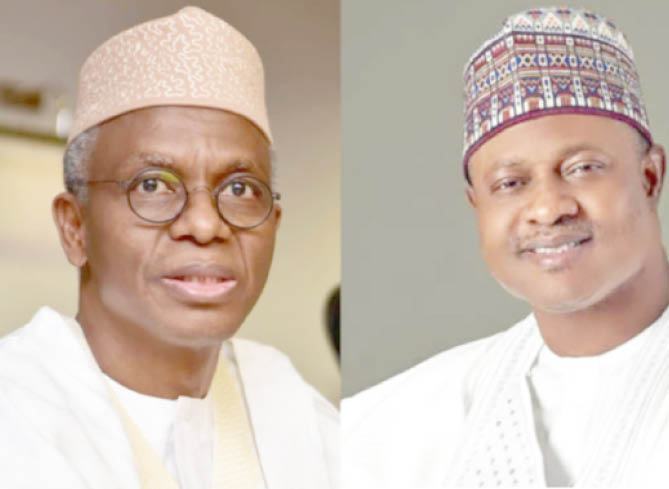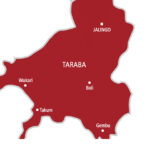The removal of Samuel Aruwan, the former Kaduna State Commissioner for Internal Security and Home Affairs, from Governor Uba Sani’s cabinet has intensified speculation about a strained relationship between the incumbent and his predecessor, Nasir El-Rufai.
Aruwan’s exit was not entirely unexpected, as tensions had reportedly been brewing between members of the current administration and individuals closely aligned with the former governor.
Aruwan, a former journalist, served as El-Rufai’s Special Adviser on Media and Publicity from 2015 to 2019. After the 2019 elections, he was appointed pioneer commissioner for the newly created Ministry of Internal Security and Home Affairs, a position that significantly elevated his influence within the El-Rufai administration.
Sources close to the administration revealed that Aruwan enjoyed considerable autonomy due to his close relationship with El-Rufai, and he played a key role in supporting Uba Sani’s governorship bid, even as El-Rufai initially had reservations about Sani’s candidacy.
Despite his contributions, Aruwan was not reappointed as Commissioner for Internal Security after Sani assumed office. Instead, he served as the ministry’s overseer for over a year while other commissioners were confirmed. Additionally, he was appointed Administrator of the Kaduna Capital Authority, a position he held alongside his role in the internal security ministry.
While the previous administration, including Aruwan, faced allegations of misappropriating N423 billion by the state assembly, he remained part of Sani’s cabinet. However, several of Sani’s allies reportedly viewed his continued presence as problematic, advocating for the removal of individuals perceived as loyal to El-Rufai.
Eventually, Aruwan, along with Shizzer Bada, the former commissioner for Finance, and Tijjani Abdullahi, the executive chairman of the State Universal Basic Education Board, was removed. Their dismissal followed a memo from the Code of Conduct Bureau (CCB), which alleged false asset declarations.
The removal of these officials—widely regarded as El-Rufai loyalists—has fuelled suspicions of political motivations. The Kaduna State Government provided no official explanation for their dismissal, further stoking speculation about a rift between Sani and El-Rufai.
A former commissioner under El-Rufai, speaking on condition of anonymity, suggested that the dismissals were indeed politically motivated.
“What happened to Aruwan and others is politically motivated. The present government cannot exempt itself from that,” the source said.
The former commissioner added, “For Samuel Aruwan, to be honest, he is in this situation because he was an appointee of the former governor. Not only him, but some former commissioners under El-Rufai are also under investigation by the EFCC, ICPC and the Code of Conduct Bureau. What will exempt Uba Sani’s government? Absolutely nothing.”
The source also linked the abolition of three metropolitan authorities created by El-Rufai’s administration to the alleged rift, pointing out that the heads of these authorities were all El-Rufai appointees.
Similarly, a former state executive of the All Progressives Congress (APC) argued that the dismissals were disguised as efforts to facilitate investigations but were, in reality, a move to purge El-Rufai loyalists from the government.
Efforts to obtain comments from Malam Ibraheem Musa, the Chief Press Secretary to Governor Uba Sani, were unsuccessful, as he did not respond to calls and text messages.
However, a source within the government, who preferred to remain anonymous, dismissed allegations of a rift as baseless.
“The removal of Samuel Aruwan and Shizzer Bada, the commissioners of Internal Security and Finance, respectively, has nothing to do with the so-called rift which exists only in the imagination of political jobbers and the media,” the source claimed.
According to the source, the dismissals were based on a court order issued in October following an ex parte motion filed before the Code of Conduct Tribunal.
Gov’t warns appointees against irresponsible social media posts
Meanwhile, the state government has cautioned political appointees against what it called irresponsible social media posts, warning that such actions could harm the administration’s reputation.
This advisory was issued in a communiqué following a two-day capacity-building workshop organised by the office of the Head of Service and the Principal Private Secretary to Governor Uba Sani.
The workshop, held from 4th to 5th December, stressed the need for discipline, loyalty and professionalism among public servants.
The communiqué, signed by Alhaji Waziri Garba, Senior Special Assistant on Administration, and Malam Ibraheem Musa, Chief Press Secretary, highlighted that improper social media use by appointees could be misconstrued as the government’s stance, leading to public outcry or reputational damage.

 Join Daily Trust WhatsApp Community For Quick Access To News and Happenings Around You.
Join Daily Trust WhatsApp Community For Quick Access To News and Happenings Around You.


